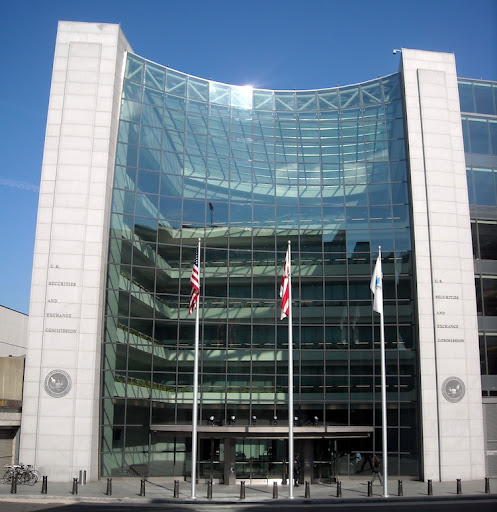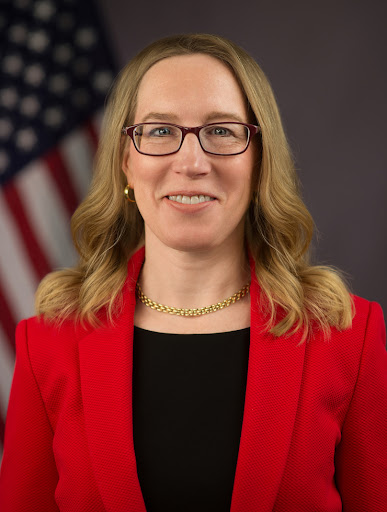Op-Ed: We Need More Than a Securities Regulator’s Perspective on ESG
Conversations about environmental social corporate governance on campus hide the blatant issues with the framework
Sam Perri & Marty Strauss
March 5, 2023
We are in such a good position
in the US
that we’ve reached such a level of prosperity
that we care about lots of things
In less developed countries
people are thinking
about
their children and keeping houses warm
but
not
carbon
emissions
Trying to force that on them is immoral –
now that
we are doing so well,
we are going to force everyone to
stop
emitting
carbons
so that
we can be in a better position and
I think
that
can be really problematic
~Hester Peirce,* SEC Commissioner (Trump appointee, former WilmerHale associate)
(*answering an audience question, as recounted from contemporaneous notes, and stylized as poetry, by Marty and Sam)
![]()
On Friday, February 24th, the Harvard Chapter of the Federalist Society hosted an event called “A Securities Regulator’s Perspective on ESG.” Professor Howell Jackson and SEC Commissioner Hester Peirce conversed about ESG and answered several audience questions.
ESG is business shorthand for environmental, social, and corporate governance. It essentially involves corporations or funds taking actions that seem to be, at one level or another, supporting environmental and/or social welfare. Because the term itself is so broad, it can be deployed in different ways. For example, a corporate executive board deciding to increase its diversity can be deemed an ESG move. Or a corporation deciding to go carbon neutral is considered part of ESG. Quite frankly, anything that makes a corporation or fund look like it cares about anyone besides shareholders seeking to exclusively turn a profit can be qualified as ESG by that same corporation or fund.
Where the SEC fits into ESG is interesting to briefly consider. The SEC’s mission is to protect investors, maintain “fair, orderly, and efficient markets,” and facilitate capital formation. The Commission “strives to promote a market that is worthy of the public’s trust.” To achieve that mission, the Commission requires that public companies, funds, asset managers, investment professionals, and certain other market participants disclose “significant financial and other information.” These disclosures help ensure that investors have the information they need to make informed investment choices. Making corporations and other public funds disclose policies and initiatives that impact social and environmental welfare (ESG) is—arguably, as we learned at this event—essential to that mission.

Photo of SEC Building found on Wikimedia Commons
Yet, as the speakers conceded almost immediately, ESG is functionally meaningless in the more general sense. Peirce did not claim to know what ESG was. At one point, she defined it as a “trendy bandwagon” to be jumped on and, at another point, as a combination of “unrelated” issues put into one larger bucket. Jackson admitted that what is required by a fund seeking to align itself with ESG is confusing: Does it involve screening and excluding certain investments? Trying to change the behavior of management? Using governmental compliance as a proxy for good management? Jackson reckoned that ESG made things complicated for investors trying to compare funds.
Despite this refusal to define ESG—or really even attempt to define it—the speakers were more than willing to share their concerns and observations about it. Jackson suggested that investors are increasingly thinking about ESG, especially the environmental component. ESG is “more than a fad,” he said. And there are many important questions to be asked about the disclosure requirements, the regulatory implications, the costs imposed on corporations, and—
If you’re bored, reader, so were we. That may in fact be the point. The real, tangible issues of environmental destruction and social degradation, ideas which inspired people to hold corporations accountable for their environmental and social impacts in the first place, weren’t mentioned at this event. The focus was shifted away from the stakeholders that might be harmed by corporate law and power, and towards the individual “reasonable investor” – a person who, in Peirce’s estimation, cares only about maximizing their return and has no interest in something like ESG, or their personal values, getting in the way of their investment decisions.
If you’re bored, reader, so were we. That may in fact be the point. The real, tangible issues of environmental destruction and social degradation, ideas which inspired people to hold corporations accountable for their environmental and social impacts in the first place, weren’t mentioned at this event.
Peirce’s view of the “reasonable investor” seems implausible. The average investor probably does care about the social and environmental impacts of their investments for both moral and financial reasons.
If individual people are not willing to put the time and energy into researching and figuring out which companies they are aligned with and want to invest in, too bad. “There are things I would like companies to be doing, but I don’t think it’s the SEC’s job to find [information on that] for me,” she explained. Moreover, if the SEC required companies to disclose their work’s practical effects on social welfare, it would be costly to those companies.

Hester Peirce, Commissioner of the SEC and Speaker at Harvard Federalist Society Event, found on Wikimedia Commons
This framing of ESG, as something we cannot define and irrelevant to financial decisions and investment choices, makes the SEC’s job easier. One less thing to ask companies to think about and disclose!
And, Peirce added, it’s not the job of asset managers to encourage companies to pursue social welfare. Peirce described that practice, tellingly, as “strong-arming.” “It’s not their money,” she maintained. She claimed that asset managers seeking to do good with money are motivated by “personal feelings” and “virtue signaling.” Asset managers, she insisted, need to do a better job of hewing to the (almost always monetary) objective of the fund they are managing.
There are many issues with this framework. Most individual investors don’t have a great understanding of what funds, if any, are truly socially responsible (regardless of what those funds advertise), and don’t have free time to do the research that Peirce suggests. Beyond that, people are constrained and moved by the systems and situations in which they are operating, systems and situations that are—in large part—fabricated by the organizations, institutions, and collectives wielding their money and influence to create a reality that keeps them in power. Those who are disadvantaged, in effect, are the individual actors who Peirce points to as capable of resolving social and environmental issues.
Peirce’s desire for limited ESG regulation leads to consequences that, in any environment other than a Fed Soc lunch, are laughably absurd. She pointed out that no one would want to work for a company that sees the East Palestine train derailment chemical spill and says, ‘who cares,’ but that they also wouldn’t want to work at a company that is beholden to too many conflicting interests. It would be wrong to ignore injustice, but it would be difficult to consider various stakeholders’ interests. Gotta make sure we account for both sides! And while Peirce gestured to the negative implications of the train derailment, her framing excluded those harmed and which companies should be held accountable for the harm that they produced.

Clean up of a small creek in East Palestine, Ohio, found on Wikimedia Commons
Later on (as delicately expressed in the poem that opens this piece), she twisted ESG into an actively harmful force while answering an audience question, suggesting that a focus on environmentalism could be “immoral” and “problematic” in light of poor people preferring a maximum return to stay warm and well-fed.
At other times, Peirce seemed to buy into the idea that index funds can be radical, mentioning “outwardly activist funds.” Using such language evinces a total misunderstanding of the purpose of capital. There is a deep ignorance – or, at best, a lack of awareness – here. From where Peirce is sitting, one can conclude that ESG might not be perfect; but can it really be bad to hold corporations accountable for the effects of their work? Why not have corporations be bound by some amount of environmental and social concerns and objectives?
Where ESG can easily do more harm than good, though, is in its shifting of responsibilities. For example, its lack of definition allows corporations and corporate firms to launder their clearly anti-environmental business through an environmentalist sheen.
Where ESG can easily do more harm than good, though, is in its shifting of responsibilities. For example, its lack of definition allows corporations and corporate firms to launder their clearly anti-environmental business through an environmentalist sheen. Placing the burden on individual investors to see through this haze enables a system in which true environmental and social accountability is unlikely, but corporations are not at fault. It’s all the feeling good of environmentalism, without any of the doing good.
It is understandable that the SEC might not see themselves as directly responsible for saving the environment, or increasing social welfare for that matter. But if they refuse to step in at all, who will? In 2023, as the wildfires burn, the hurricanes rage, and warm winters reach record temperatures, we are past the point of arguing about whose problem climate change is. It is incumbent upon all of us—lawyers in every field included—to do their part in creating a better world.
![[F]law School Episode 5: The Business of Boredom](https://theflaw.org/wp-content/uploads/2024/10/Reed_1-640x427.jpg)






